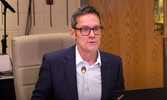The Public Works Department presents the most recent analysis data on the presence of lead in Gatineau's drinking water
Sonia Roy
That was the question at the heart of discussions at the City Council's Plenary Committee meeting this week. During an analysis organized by the Executive Committee and explained by Mr. Yvon Desjardins, Director of Gatineau's Public Works Department, on June 21, the most recent results regarding the quantity of lead in the city's drinking water and possible solutions were presented. Accompanied by Mr. Nicolas Grignon-Lemieux, responsible for the optimization and planning of waterworks and surface drainage operations, and Mr. Marc-André Venne, division chief for waterworks and surface drainage operations, Mr. Desjardins reminded the audience of the latest amendment to the Quebec government's Regulation respecting the quality of drinking water (RQEP), which dates back to March 25, 2021. This amendment provides for the lowering of the lead standard in water (formerly 0.010 mg lead/L of water, now 0.005 mg lead/L of water), in addition to changes in the sampling methods used. The amendment to the regulation in question also makes it mandatory to produce an action plan to remedy the presence of lead in the drinking water of the various Quebec municipalities. The consensus of this presentation, which raised several discussions within the council, is that although there is no reason to be alarmed by the minimal presence of lead in the drinking water of the Gatineau districts, it is important for the Quebec government to supervise and encourage the replacement of lead-containing plumbing throughout the territory.
Lead in drinking water, really?
Although Gatineau does not have any lead water mains in its facilities, there are currently 20,100 buildings in Gatineau that may have lead piping. The use of lead in the construction of piping, which has been prohibited in Quebec since 1980, was a common practice between the 1940s and 1970s, especially for small piping. Thus, most of the buildings concerned are private residences, where the replacement of pipes is done on a voluntary basis. Although Gatineau’s drinking water is perfectly safe to consume according to the health authorities, long-term exposure to high lead quantities can be dangerous for everyone, but especially for pregnant women and children.
Results up, citizen participation down
Declining citizen participation is certainly an interesting struggle raised during the June 21 presentation. A comparison between the years 2013-2019 and the years 2020-2021 shows that for 15 non-standard samples out of a total of 187 samples taken in the last two years, none of the 15 addresses concerned chose to replace their water pipe, compared to 15 pipe replacements between 2013 and 2019, for 72 non-standard samples. Samples for lead in drinking water from 2013-2019 were found to be anomalous in 7.2% of cases, compared to 8% of cases in 2020-2021. The data presented by the City of Gatineau also shows that the number of refusals of access to citizens' property is on the rise (166 refusals in 2020 compared to 226 refusals in 2021). It should be noted that, legally, citizens who have lead water inlets are under no obligation to proceed with replacement work.
Proposed solutions
The first difficulty raised by this presentation is that the cost of labor and operations related to sampling (which now takes longer following the RQEP addendum), are increasing over time, without any real change. Secondly, the variable cost of a water main change (for which citizens must hire a private subcontractor) combined with the increase in refusals to cooperate is forcing the City to review its procedure. As a result, two proposed by-laws, one to regulate the accessibility of private properties for water testing and one to regulate the time frame for changing a lead water main, are currently under review by City Council. Four financial assistance scenarios, which would provide monetary assistance to residents who agree to change their problematic plumbing, have been proposed to the plenary committee. The latter was visibly divided on the issue. Many councilors (Mr. Steve Moran, Mr. Louis Sabourin, Mr. Jocelyn Blondin) mentioned their discomfort with the idea of potentially imposing the change of a leaded water inlet on citizens within a 36 months’ time frame. The request for a detailed map of the districts at risk of having leaded private water inlets and for more information on the effects of the recommendations on citizens was made to the Public Works Department. The Plenary Committee is expected to return to the issue at the next City Council meeting on June 28, 2022.
Photo caption: Mr. Yvon Desjardins, Director of the Gatineau Public Works Department
Photo credit: courtesy of Ville de Gatineau


